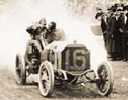Uncensored CART Commentary
by Ed Donath
A Standing Invitation?
10 reasons why standing starts are wrong for CART
8/25/02
ATHENS, NY—In the wake of a spate of first-lap/first-turn incidents and attempted jump-the-guns there has
been more and more murmuring lately about CART changing over to standing starts. The truth of the matter is
that ultra-competitive racing and the recklessness of a small number of Champ Car pilots have been to blame
for the carnage; a problem that wouldn’t be nearly as acute if there were 10 more cars in the fields like there
used to be.
Without even invoking the “it-ain’t-broke-so-don’t-fix-it” clause or reminding fans of our beloved speed
sport that there are already too few traditions left for Grandpa Chris to mess with, here are 10 reasons why
CART should retain its flying start format:
- The Pace Car Unit is, after all, the only division of the Champ Car Company that has never cast a negative
reflection on CART. Why penalize it? For most of the pace cars’ history they have been the promotional/advertising
arm and custom paint-job showcase of CART’s former series sponsor, PPG, while serving double duty by giving
exposure to various engine manufacturers’ passenger vehicles. Thousands of miles of accident-free rent-a-rides,
VIP hot laps and, of course, actual pacing—conducted ostensibly by professional female drivers—has produced
neither injury nor litigation. This is a most impressive and commendable record that tells a wonderful PR
story-within-a-story.
- By curtailing pace car activity, the salability of sponsorship(s) for the aforementioned program—and the
revenue it produces—would be diminished. Also, when the promised next wave of “engine manufacturers” (read:
badge buyers) comes on board, those carmakers will certainly want, and deserve to have, as much exposure as
possible for their showroom vehicles. One lesson that should have been well learned as a result of Honda
deciding to bail, in part, because of shabby treatment is that CART’s engine partners deserve to be featured
prominently and as often as possible during race weekends.
- Eliminating rolling starts would also eliminate one of the fuzzy distinctions between CART and F1. There
is already too much identity confusion between CART and f-inheritor, so why create new mix-ups?
- Tire temperature—now more than ever before, as a result of new mandatory pit stop rules and the fact that
the FedEx Championship Series is a one-tire deal—is historically CART’s single biggest speed/handling inhibitor.
The various Handford Devices rank a distant second. Going to standing starts would literally force tire-warming
technology to be brought into play. Aren’t we trying to save money here, not spend more?
- “First Turn Bottleneck Crash Syndrome” will not be eliminated by going to standing starts because the same
number of cars will still be reaching the same dangerous point on the circuit at the same time. FTBCS, as you
know, is the primary cause of L1CI—First Lap Contact Incidents.
- Standing starts are not a guarantee against catastrophic first-lap multi-car crashes. In the last decade,
F1 has red-flagged and re-started more races than CART. Only one of the two FedEx Championship Series races
re-started in the last 10 years was on a street or road circuit (’95 Molson Indy Vancouver). The other was
the infamous crash that occurred just before the field reached the start/finish line to take the green flag
at the inaugural US 500 at Michigan Speedway in 1996.
- Speaking of ovals: While there aren’t too many of those left on the CART schedule, the remaining speedway
events certainly must continue to incorporate flying starts.
- Pace cars are, first and foremost, safety vehicles; in motorsports it is always better to err on the side
of safety. Even standing start-oriented ForMoola One now uses its once-dreaded safety cars pretty frequently.
- Standing starts are rougher on the equipment and the pocketbook—especially clutches, gearboxes and drive
components—than flying starts. Furthermore, they have historically been the breeding ground for illegal
traction aids in series that employ them.
- Interesting strategic nuances of Champ Car racing such as parade lap “pit stops” and “getting a jump on
the field” would be lost with standing starts. Be honest: How often do you find yourself rooting for the
smartest team and driver to snatch a victory from the fastest?
Copyright © 2002 by Ed Donath and Deep Throttle. All Rights Reserved.
Ed Donath Archive
|




